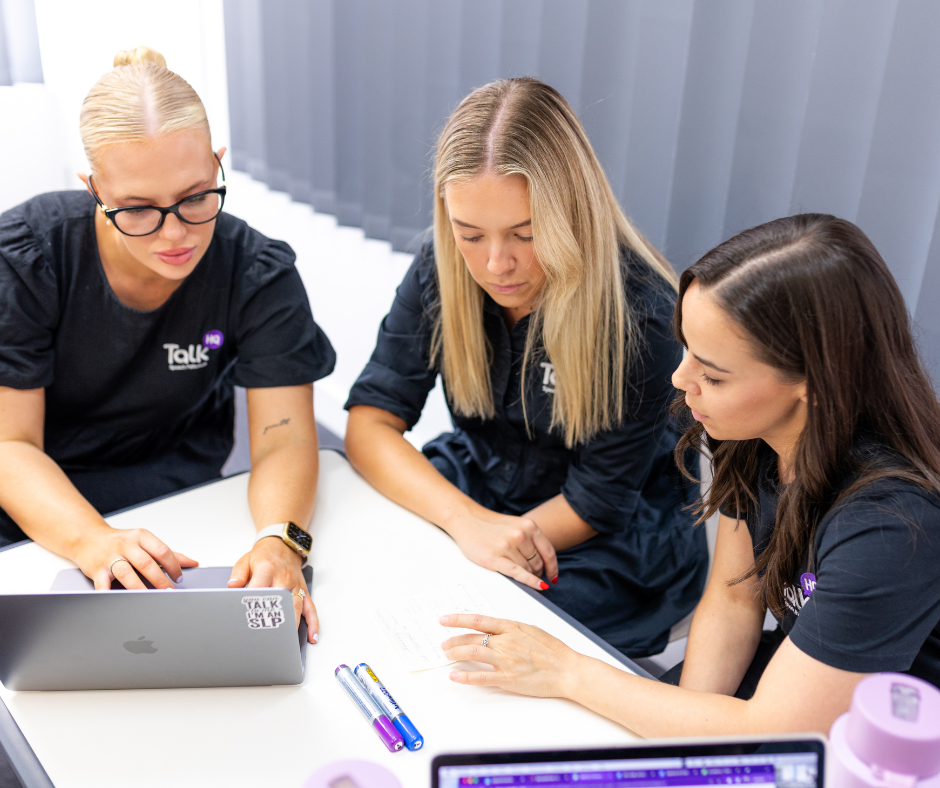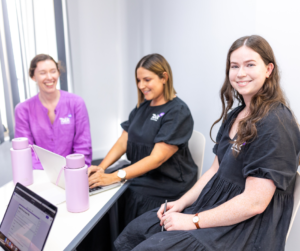Starting your student placement can be both an exciting and daunting experience. There are a lot of things to organise and prepare for before you start. It’s important to ask as many questions as possible to ensure a smooth transition into your new role.
In this blog post, we will discuss 10 things that you should ask BEFORE starting your student placement in a paediatric speech pathology clinic. This will help set the expectations for both you and your supervising speech pathologist. Knowing these things beforehand will help you make the most of your learning experience!
The next step is to introduce yourself and start to prepare for your upcoming placement. Here are three things to make sure you ask your clinical educator BEFORE your first day on the job.
1. Is there any paperwork I need to complete before starting my student placement?
Before you start student placement, make sure to ask about the compliance/regulation paperwork.
We know you already have your Blue Card and COVID vaccination certificate. However, some workplaces require you to fill out additional paperwork. If you have a hospital placement, you are likely to need induction training relevant to your hospital setting. If your student placement is in a private practice, you may need to complete online training specific to your placement workplace. This may include NDIS worker induction modules or cultural awareness training.
Find out if you complete the training prior to starting your placement. Alternatively, you may complete the training within your first week of your placement.
Such training is important as this allows agencies to provide the best possible support for students and their clients. Complying with the training requirements ensures that you are adequately prepared to work with people with disabilities, and/or Indigenous Australians. Additionally, compliance helps to protect the rights of people with disabilities and our First Nation People. It ensures that they receive the supports they are entitled to.
Make sure you get in contact with your clinical educator early enough that you have time to complete any required training!
2. What should I expect on my first day?
This is really more than one question. This detail prepares you for your first day. Make sure you record it so you arrive on time without feeling rushed.
Make sure you know:
- Where your placement is located (and look up how to get there ahead of time!);
- Expected starting time;
- Do you need to bring anything with you (e.g. do you need a computer, or just a pen and paper to take notes?);
- What tasks you will need to complete on the first day – will you be completing an induction, shadowing sessions, or jumping straight in with clients;
- How many breaks are there in the day (e.g. lunch, morning tea);
- How many clients you’ll be shadowing or working with;
- Whether you will be in one place for the whole day or moving around – if you’ll be moving around a hospital, consider bringing a box or bag to hold your resources;
- What time your day finishes.
The more information you can find out ahead of time, the more prepared you will feel when the first morning rolls around!
3. What will my first week look like?
Placements vary so much so you need to get a sense of what your first week will look like.
To get the most out of your student placement, it is also important to be proactive and take the initiative to learn as much as you can. Here are a few things to keep in mind for your first week of student placement:
– You will likely be assigned to area of the organisation, so make sure you know where you are supposed to be and who to ask for if you need help.
– You will be given a schedule of sorts, but it is always best to arrive early.
– There will be a lot of new faces, so don’t hesitate to introduce yourself and ask questions. The more people you meet, the more likely you will feel more comfortable at the workplace and enjoy yourself.
– Be willing to take on any task that is asked of you, no matter how small. This is an opportunity to learn and gain experience, so make the most of it!
You may also want to ask:
Are you seeing clients right away? If so, how many each day?
Will the clinical educator be in the same room or looking through one-way glass.
Will you get time to prepare for sessions during the work day?
Does the clinical supervisor need the session plans at a specific time each day?
Will you be given written feedback on your session plans before you conduct the therapy session?
Once you know this information, you can start to plan how your week may look and start to look forward to the experience!
4. What type of clients will I be working with on placement?
This question is a good one so you know what to revise. This information also helps you manage your expectations from the placement. If you have a particular interest in an area of practice, let your clinical educator know! It would be such a great opportunity if the workplace is able to accommodate your request to provide more exposure and experience in this area.
Also your clinical educator may use this information when assigning clients for you to work with over the course of your placement.
5. How many clients will I see ?
Knowing how many clients you are expected to see each day will also help you prepare for your student placement.
Depending on your placement, you may be expected to see as few as 1 a day or as many as 5 or 6 a day. Remember, there is a difference between seeing that many clients and independently treating them. Typically, you will start with a lower number with the expectation that you will gradually increase your caseload as you get more familiar with the cases. This is a positive thing!
Student placement is a great way to get hands-on experience in your field of study. It helps you apply the theory into practice and really experience the working life of a speech pathologist. This is why it can be good to see and treat more than 3 clients per day by the end of your placement. It also means you will have more examples to talk about when it comes to your VIVAs in final year.
6. What does a successful student placement look like at your workplace?
The Compass assessment is an important way to show your competency in speech pathology.
Your clinical educator will assess your skill level based on your demonstrated ability to effectively communicate with clients, understand and interpret clinical data, and develop treatment plans. Additionally, you will be expected to show a passion for helping others and a commitment to continued learning.
Find out what a successful Compass looks like to your clinical supervisor. Ask them how specifically what a successful session plan looks like half-way through your placement compared to at the end of your placement. Can they describe previous student placements that worked well?
Being clear on what they view as a successful student placement will give you insight on their expectations.
Knowing this, you will be well on your way to becoming a competent speech pathologist.
7. How will feedback be given?
Feedback is a crucial part of student placement. Honestly, clinical educators want to see you improve and this is why feedback is needed. It doesn’t need to be a scary thing. We can’t improve what we don’t know. Feedback can take many different forms, but it is always good to know how the feedback will be given. This gives you certainty on areas you are doing well in as well as what to focus on.
There are a few different ways that you can receive feedback on your student placement. The first is through formal feedback from your supervisor. This may be written or verbal or even through demonstration during the therapy session. This can happen at the end of each session, or at the end of each day. Formal feedback will give you specific comments and suggestions on your performance, and it is a good way to get an overview of how you are progressing.
You can also ask for feedback from your peers. This can be informal, or you can arrange to meet with them regularly to discuss your placement experiences. Peers can offer a different perspective on things, and they may have helpful suggestions for you.
Finally, you can also reflect on your own performance by keeping a journal or portfolio of your work. This can be a valuable way to track your progress and identify areas where you need to improve. Keep it short and use this template to help:
1. One thing I did well was:
2. One thing I found difficult was:
3. One thing I need more information on is:
8. Will I get to observe other speech pathologists’ sessions?
Observing other speech pathologists working with children is such a powerful learning tool. If you are given this opportunity, be sure to make a note of the following:
- What words do they use when they give feedback to the child?
- What games do they use to keep the student focussed?
- Are they using particular resources that you could use also?
- How do they write up their session notes?
- How do they communicate with parents/teachers?
Seeing this first hand will help you understand their communication style and interaction styles. Plus, it gives you loads of ideas on how to deliver therapy for your clients.
If your clinical educator is open to the idea, you could always request to observe other speech pathologists when you don’t have direct therapy sessions booked in.
At TalkHQ, we continue to do shadowing of other speech pathologists within the team. That’s right! Even experienced clinicians find this type of learning so helpful! We shadow our peers’ sessions as well as have senior speech pathologists shadow our therapy sessions. The feedback from the team is unanimous – we love observing other speech pathologists therapy!
So don’t hold back! Get as much observation in as you can!
9. What assessments should I be familiar with?
Each workplace will have their own way of conducting assessments. This is because the assessment process differs depending upon its purpose.
There is no way you are expected to know every assessment before placement. Ask your clinical educator what are the most commonly used assessments in their workplace. If you have time, you can learn more about them on YouTube or at the university’s clinical education building. If not, that is OK! That is what placement is for!
Different workplaces have different assessment systems also. Some places expect you will complete an assessment in the first session. Others prefer you to only focus on the case history and building rapport in the first appointment.
At TalkHQ, we have a specific assessment process. Our students are expected to follow this process when administering assessments. Having this information ready for students makes it easier for them to succeed.
Remember, your clinical educator is there to help you. You are not expected to know how to administer and score every speech pathology assessment produced!
10. What resources will I have access to?
A big contributor of stress is making resources on placement. That is why you must ask what resources you will have access to while on student placement. It will help you with your time management.
At TalkHQ, we have oodles of resources so students quickly learn all the cool therapy resources they have at their fingertips. They do not need to waste time creating new ones. Knowing this helps them relax and plan for their upcoming placement.
By asking your clinical educator these ten questions, you can feel confident that you’re prepared for your placement and be ready to hit the ground running. Now all that’s left is to take a deep breath, open up your email, and start typing!







